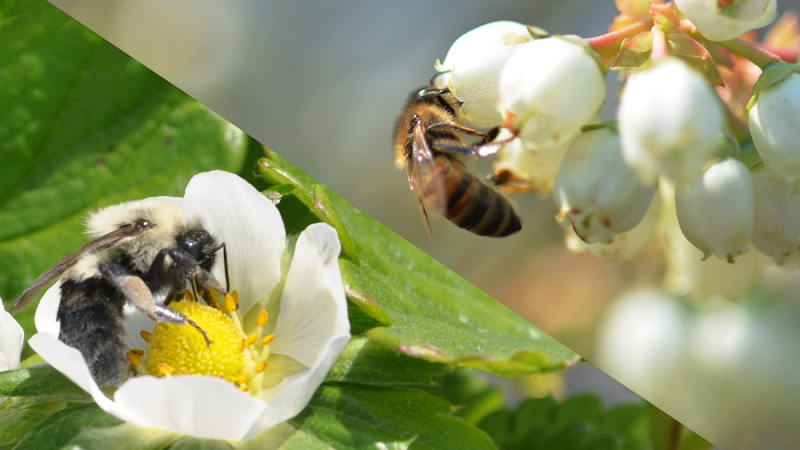Meet The Next Generation Of Fruit Growers
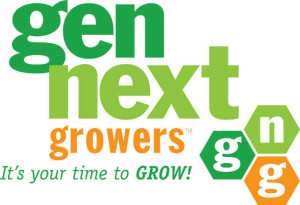 Despite the many misconceptions the general public may have about farming, there is one notion that holds true: farming is by and large a family affair. A number of fruit, nut, and vegetable farms in this country are family owned, with some spanning multiple generations. Over the years, as one generation takes over from the next, the issues they deal with may change, but the ties to the land and the passion for producing a tasty and nutritious crop remain.
Despite the many misconceptions the general public may have about farming, there is one notion that holds true: farming is by and large a family affair. A number of fruit, nut, and vegetable farms in this country are family owned, with some spanning multiple generations. Over the years, as one generation takes over from the next, the issues they deal with may change, but the ties to the land and the passion for producing a tasty and nutritious crop remain.
However, there are indeed several new concerns that this latest generation of growers must tackle: the rising tide of regulations, constant labor shortages, the ever-widening gap between farm and fork, and much more. With all these headaches, it’s certainly understandable if one were to say “Enough already!” and give up the land their ancestors once plowed and tilled.
And yet they withstand. Ask any young farmer, and they will likely tell you that it’s all worth it. They see a rising world population, and they recognize the critical need (and the huge opportunity) for them to provide a resource that no one can do without. Their needs may be more business-focused than production-based, and they must navigate and filter the endless stream of information that’s coming at them every day. But in the end, it goes back to the fruit hanging on the tree or the vine, and how they can get it into the right hands.
With that in mind, the editors of American/Western Fruit Grower, along with sister publications American Vegetable Grower and Florida Grower, have launched a new program called “GenNext Growers.” This program is designed to provide the coming generation with the tools they need to improve their skills on and off the farm, and a network where they can share ideas, expertise, and dreams.
As you click through the rest of the pages in this story, you will read more about many of these individuals. Some come from small retail operations, and others export fruit from thousands of acres. Some are already making the big decisions for the company, and others are just starting to emerge from the shadows. Whatever the case, they all share common needs and are using all tools at their disposal to make things better for themselves, their business, and the people they work with.
This is just the start of what will become regular coverage of the next generation of growers. Whether you are a part of this group, or are guiding them along the way, we hope you will pick up a few insights, and share your ideas as well
Dan Plath, Washington Fruit & Produce Co., Yakima, WA

Dan and his uncle Cliff head up the orchard management team. They are predominantly apple growers but also farm cherries and winegrapes. Their farms are located throughout central Washington.
Why did you choose agriculture as your career path?
I always knew that at some point, I wanted to work in the family business. Farming is where I was given an opportunity, and I think it’s turned out to be a great fit.
What opportunities do you have that the previous generation could not avail themselves of?
Technology allows us to work more efficiently. With the smart phone we now have a computer in our pocket on the farm. I have email, text messaging, all of my computer files, Web search capability, frost forecasts, soil moisture, disease, and insect data with me all of the time. Oh, and it’s a cellular phone too.
What advice would you give to the next generation?
Listen to your elders.
Russell Holmberg, Holmberg Orchards, Gales Ferry, CT
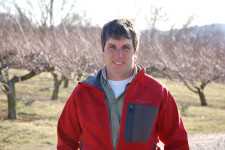
Russell is manager of farm operations at Holmberg Orchards.
If you weren’t in the farming profession, what would you be doing?
I am a tinkerer at heart. I would probably be a mechanical engineer, or perhaps working to engineer transgenic crops.
What agricultural issues keep you up at night?
I worry a lot about the push back I am seeing toward chemical and biological technology from the general public. It seems like there is a lot of fear and confusion about what we do on the farm that is working its way toward Washington, DC. I fear that we are going to lose important tools if the agricultural community does not begin to counter the claims of a vocal minority.
What can be done to bridge the gap between farm and fork in the U.S.?
We need producers, not authors and intellectuals, on the morning talk shows explaining where your food comes from. We need farmers in the elementary schools, high schools, and colleges, explaining how and why we grow food the way we do.
What advice would you give to the next generation?
Go visit other parts of the country and other parts of the world. See how they farm, listen, learn, and ask questions.
Brenton Roy, Oasis Farms, Prosser, WA
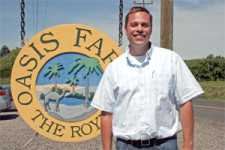
Brenton grows winegrapes, apples, cherries, and berries on a 1,500-acre farm in Washington.
Why did you choose agriculture as your career path?
I was very motivated by the autonomous lifestyle combined with the never-ending challenge of the job. It really is an endeavor that is limited only by your imagination, ingenuity, and work ethic.
What issues keep you up at night?
Labor, labor, and labor. Also sometimes seemingly unrelated occurrences, happening in other parts of the world, will affect our ability to produce or sell our products, even if those products are not exported.
What opportunities do you have that the previous generation could not avail themselves of?
I received a great education, which I use to help sort out the fast-paced information age we live in.
Mike Omeg, Omeg Orchards, The Dalles, OR
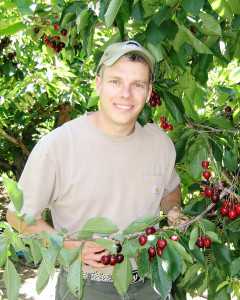
Mike has taken over management of the farm, which grows cherries.
What issues keep you up at night?
Our team relies on me to make sound decisions that benefit us all. If I make a mistake, all 23 families, including my own and our team members’, that rely on the farm for income, suffer.
How do you envision new technology impacting how you farm in the future?
Technology is the only way that modern agriculture can make up for the ever shrinking supply of labor available to the ag sector.
What type of media do you find most useful on the farm?
Trade magazines are the most useful media to me. The web might get there in the next few years, but the dog-eared copies of trade magazines remain in my reference library and are still of critical importance to my farm.
Justin Weaver, Weaver’s Orchard, Morgantown, PA
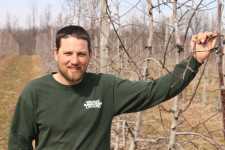
Justin is production manager at the fruit and vegetable farm, and is also involved in packing and retail.
What challenges do you face that the previous generation did not have to negotiate?
Of course there are many new challenges, but to me there is a greater dilemma that comes with increased technology and social media. While it can be very useful, and I love change and progress, it can be really hard to weigh the pros and cons, and sometimes we can miss the cons until it is too late.
What can be done to bridge the gap between farm and fork in the U.S.?
For us being a direct market business, that means really making connections with our customers, allowing them to come out to the farm and get a glimpse at what it is like. For those more disconnected, I have been impressed with how some have used Facebook, blogs, and YouTube to give a picture of where our food comes from.
What professional development skills are you most interested in enhancing?
I am always interested in increasing my horticultural skills but also tend to gravitate toward books on leadership.
Sidney Kuhn, Kuhn Orchards, Cashtown, PA
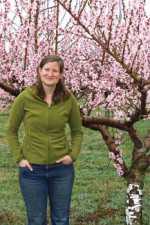
Sidney is in the process of taking over ownership of the 300-acre fruit and berry farm.
What issues keep you up at night?
Uncertainty of what our crop will be every year, especially in a year like last year with early bloom followed by cold weather.
What professional skills would you like to learn?
Business, finance, and human resource management are the hardest things to learn. You can learn horticulture. I’ve tried to focus on those other areas.
Rolando Martin, Washington Fruit and Produce, Yakima, WA
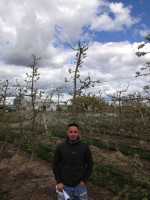
Rolando is a manager with Washington Fruit, and oversees all aspects of production.
Why did you choose agriculture as your career path?
I can’t see myself doing anything else. It’s great to say that the orchard is my office.
What challenges did you face that the previous generation did not have to deal with?
When your cost per acre increases due to labor shortages and expensive labor programs, yields have to increase or you’ll be left behind. So you have to keep up with technology and the most modern orchard designs.
Where do you get most of your crop resource information from?
Attending orchard tours and meetings are great ways to enhance your knowledge. You have the ability to take what you’ve learned and apply it to your daily operation.
Karm Bains, Bains Ranches, Yuba City, CA
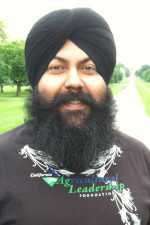
Karm is owner/operator of a fruit and nut farm, as well as a hulling and drying facility.
What non-work related issues are of concern to you?
I feel health care is very important for our nation and it seems that even with the new reforms that this is an area that is severely lacking.
What challenges do you face that the previous generation did not have to negotiate?
The previous generation did not have as many restrictions or regulations as we do now. Nor did they have the global competition or labor laws that we deal with today.
What opportunities do you have that the previous generation did not have?
The Internet, international markets, pest management, water management, and farm mechanization are so readily available to us it becomes second nature.
Ben Wenk, Three Springs Fruit Farm, Aspers, PA
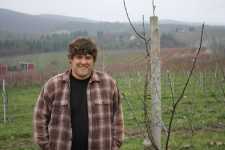
Ben is a junior partner at the farm and oversees all aspects of the farm retail business and small fruit production, and assists in tree fruit production.
What issues keep you up at night?
I have concerns over cheap imported food, especially specialty crops, its effects on human health, and its capability to increase invasive species such as brown marmorated stink bug, spotted wing drosophila, and plum pox virus.
What non-work related issues are of concern to you?
I can’t be on top of my game on the farm without being able to get away from it for a bit, and I can’t get the same personal satisfaction if my work responsibilities are begging.
What can be done to bridge the gap between farm and fork in the U.S.?
Whatever can be done will only be done by us. Nobody is going to come along and champion the cause of the American farmer if we don’t do it on our own.
Eric Genzoli, Genzoli Almond Farms, Turlock, CA
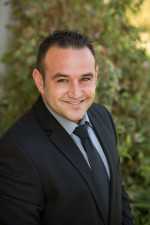
Eric is ranch manager and oversees all day-to-day operations.
What issues keep you up at night?
I think right now the biggest concern for all agriculture is water. When farms don’t get the water they need to farm, jobs are lost, family farms collapse, and the price of groceries goes up.
What professional development skills are you most interested in enhancing?
Communication is extremely important regardless of what industry you’re in. I would really like to focus on my communication skills as well as public speaking.
How do you envision new technology impacting how you farm today and in the future?
The smart phone is a computer in my pocket in which I can check the weather, use applications for calibration, and the use of GPS.
Erik Jertberg, Heart Mountain Farms, Watsonville, CA
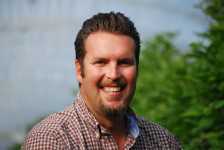
Erik is president and 50% owner of the company, which grows blackberries for Driscoll’s.
What issues keep you up at night?
I feel a huge responsibility to my wife, my family, my partner, and the people that have committed to work with me on this ranch. I just don’t want to fail their expectations. I don’t fear losing money so much — I never have — but I fear lost potential.
What can be done to bridge the gap between farm and fork in the U.S.?
I fear the disconnect from food to fork feeds the disconnect of ballot box and wallet. Without an understanding of where their food comes from, and what it takes to get it there, our consumers will believe in an ideological standard when they vote, but purchase the food for their table based on a free market economics standard.
How do you envision new technology impacting how you farm today and in the future?
There are new technologies that aid harvesters and increase productivity that help to offset the need for as many people as were once needed, but the labor shortage continues to outpace the productivity efficiencies.
Giff Burnap, Butternut Farm, Farmington, NH
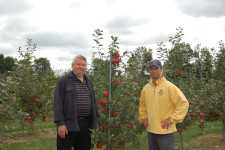
Giff and his wife Mae are co-owners of the 25-acre pick-your-own farm that produces a wide range of fruit crops.
What non-work issues are of concern to you?
I’m concerned about the work ethic of young Americans. Farming is hard, physical labor, and too many people turn away from it because of that. It’s too bad because a good living can be made in agriculture today, and the future potential for that keeps looking better as the world population increases.
What opportunities do you have that the previous generation did not have?
People in the U.S. are recognizing that farmers are a part of our society and local economies, and I think this offers a great opportunity, especially if the farm is in the retail market.
What can be done to bridge the gap between fork and farm in the U.S.?
It’s only human to want to know where our food comes from, and I think people want to get reacquainted with that.
Meredith Compton, Peaceful Valley Orchards, Pittstown, NJ
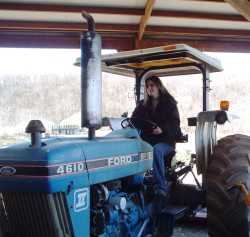
After working at a research farm at Rutgers University, Meredith and her husband Jeremy are now the first generation of ownership at the farm, which grows a variety of crops.
What issues keep you up at night?
Every time I turn around there is something from the state or county at my farm telling me about some new regulation that has to be implemented that is going to cost me more money and time. The other thing that bothers me is the misinformation that is disseminated to the general public about agriculture. People go on and on about organics or genetically modified (GM) foods, and they have no clue what they are talking about or what organic or GM even means. Most people base their opinions on emotion and not facts. We try to educate people on these issues but it’s a constant struggle.
What professional development skills are you most interested in enhancing?
My speaking skills. I enjoy talking to groups about agriculture and would love the opportunity to do more of that. I believe that by sharpening my speaking skills I can be a more effective advocate for agriculture.
Nicholas Miller, The Thornhill Companies, Santa Barbara, CA
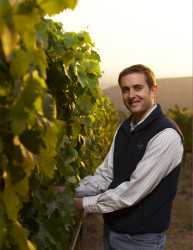
Nicholas is involved in sales and marketing at the family-owned wine company.
If and when you have kids, would you want them to follow in your footsteps?
At two years old, it’s hard to predict where he will go. Of course I would be proud if he eventually does, but our family also has a policy of working elsewhere before you return to the family business.
How do you envision new technology impacting how you farm in the future?
I see more automation and mechanization of farming, and not just in harvesting.
What opportunities do you have that the previous generation could not avail themselves of?
There is more interest than ever in wines from the Central Coast.







